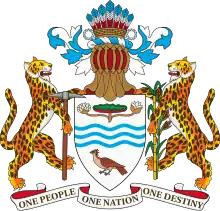| Queen of Guyana | |
|---|---|
 | |
_(cropped)_(3-to-4_aspect_ratio).jpg.webp) | |
| Details | |
| Style | Her Majesty |
| Formation | 26 May 1966 |
| Abolition | 23 February 1970 |
Elizabeth II was Queen of Guyana from 1966 to 1970, when Guyana was independent sovereign state with a constitutional monarchy. She was also the sovereign of the other Commonwealth realms, including the United Kingdom. Her constitutional roles were delegated to the governor-general of Guyana.
History
The Crown colony of British Guiana became an independent country called Guyana on 26 May 1966, with Queen Elizabeth II as head of state and Queen of Guyana.[1] The Duke and Duchess of Kent, represented the Queen of Guyana at the independence celebrations. The Duke opened the first session of the Guyanese Parliament, on behalf of the Queen, and gave the speech from the throne.[2]
The Queen's constitutional roles were mostly delegated to the Governor-General of Guyana, her representative in Guyana, who was appointed by the Queen on the advice of her Guyanese Prime Minister. The Governor-General acted on the advice of the Guyanese ministers.[3] Three governors-general held office: Sir Richard Luyt (1966), Sir David Rose (1966–1969), and Sir Edward Luckhoo (1969–1970). All executive powers of Guyana were vested in the monarch, but were mostly exercised by the governor-general on her behalf.[3]
The new Guyanese constitution provided for the country to become a republic after 45 months by a majority vote in the House of Assembly.[4] Exactly 45 months from independence, Guyana became a republic within the Commonwealth, with the president of Guyana as head of state.
The Queen visited Guyana on 4–5 February 1966, where she opened the Queen Elizabeth II National Park (now Guyana National Park).[5][6]
She toured Guyana as Head of the Commonwealth on 19–22 February 1994.[7]
Styles
Elizabeth II had the following styles in her role as the monarch of Guyana:
References
- ↑ Ralph Premdas (2014). "Guyana". In Patrick Heenan; Monique Lamontagne (eds.). The South America Handbook. Fitzroy Dearborn. p. 161. ISBN 978-1-57958-333-0.
- ↑ INDEPENDENCE GRANTED TO GUYANA
- 1 2 Page 2
- ↑ Philip Murphy (2013). Monarchy and the End of Empire: The House of Windsor, the British Government, and the Postwar Commonwealth. Oxford University Press. pp. 84–85. ISBN 978-0-19-921423-5.
- ↑ "A royal visit to welcome Guyana's independence". Guyana Times. 26 May 2019.
If Friday's schedule was considered tight, Saturday's [Feb. 5, 1966] was even tighter. [...] Later that afternoon, she was again bound for another engagement, this time to open the Queen Elizabeth National Park on Thomas Lands.
[Errata: The article wrote "Friday, February" 2 [sic], but that Friday was Feb. 4, the day before she visited the park.] - ↑ "Historic Thomaslands". National Trust of Guyana.
The National Park, located in Thomas Lands, Georgetown, was formerly occupied by the Demerara (Georgetown) Golf Club since 1923. It was renamed the Queen Elizabeth II National Park in 1965 in honour of the Queen's visit to the country. On May 25, 1966, moments to midnight, the park was the scene for one of the most historic events in Guyana's history; the Union Jack was lowered and the Golden Arrow Head was hoisted marking the birth of an independent nation. The park occupies approximately 0.23 kilometres (57 acres) and is home to several monuments. It is utilized for cultural, educational and recreational activities and is managed by the National Parks Commission.
- ↑ "Commonwealth visits since 1952". Official website of the British monarchy. Archived from the original on 12 April 2015. Retrieved 4 September 2012.
- ↑ "No. 39873". The London Gazette (Supplement). 26 May 1953. p. 3023.
- 1 2 "Guyana: Heads of State: 1966-1970". archontology.org. Retrieved 22 May 2021.
- ↑ A notice on the issuing of a royal proclamation affecting the change in the style is published in the Official Gazette, 18 Jun 1966.
- ↑ The Statesman's Year-Book 1971-72: The Businessman's Encyclopaedia of All Nations, Palgrave Macmillan UK, 2016, p. 58, ISBN 9780230271005